Specialized Guide
Location Intelligence Software: How to choose the best one?
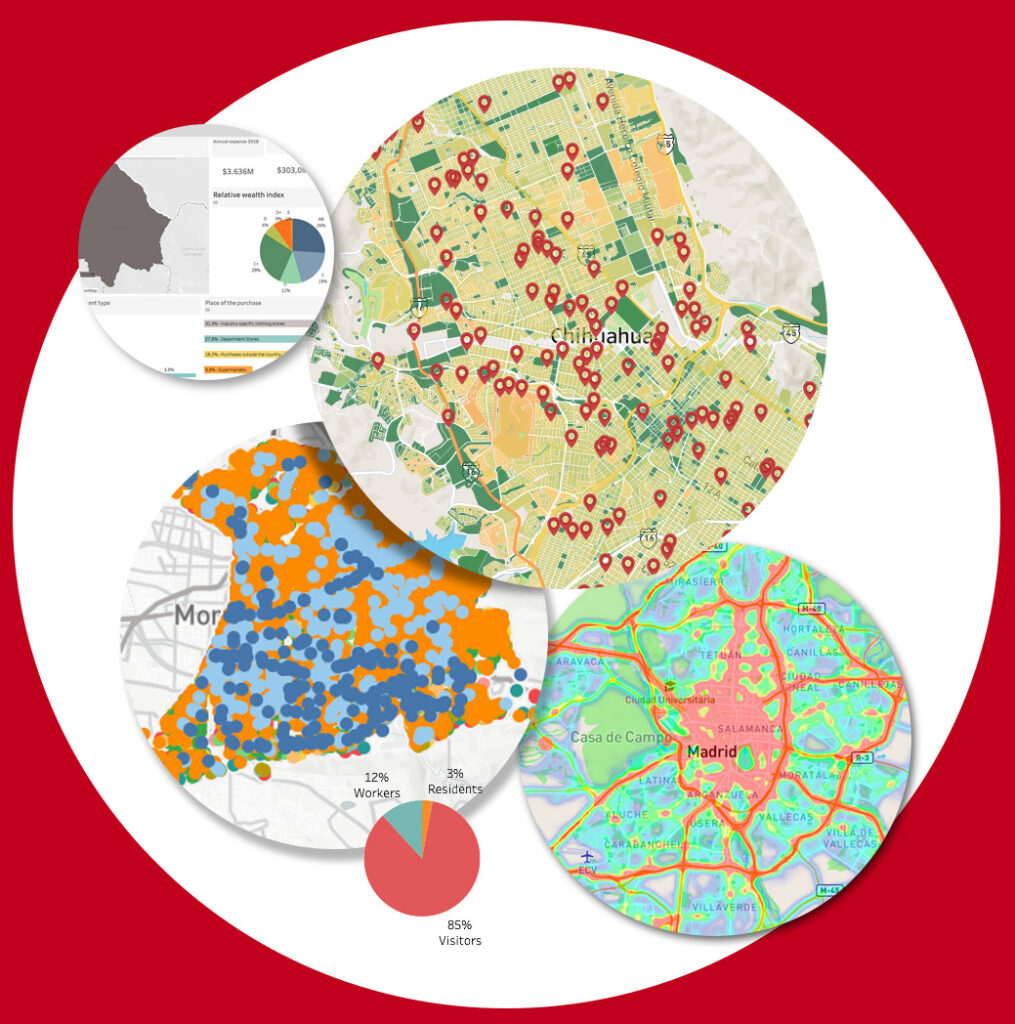







Topics covered in this guide:
- So, what is location data analysis?
- Benefits of using location analytics for business
- Predictive location analytics
- How Location Intelligence Tools can boost a sales team performance
- The role of Location Intelligence for brick-and-mortar retailers
- The importance of choosing the right location intelligence tools
- PREDIK Data-Driven: An expert location analytics company
Companies are seeking new ways to extract value from vast information datasets in today’s data-driven world. Location data analysis has become increasingly popular. It involves combining geographic and spatial data to uncover patterns and insights that are not obvious.
By analyzing location based data, organizations can make better decisions, enhance customer experiences, and optimize operations across multiple industries.
So, what is location data analysis?
Location data analysis examines and interprets geospatial data to uncover hidden relationships, trends, and patterns.
This analysis use geospatial technologies such as Geographic Information Systems (GIS) and location intelligence platforms for our analysis. This allows a transformation of raw location data into useful insights.
Location intelligence analytics is a sophisticated type of location data analytics. It plays a key role in unlocking the full potential of location data. This allows businesses to gain strategic insights and actionable intelligence.
Benefits of using location analytics for business
Location intelligence solutions can be integrated into location data analytics. This enables businesses to tackle a variety of challenges and opportunities. Examples include:
Better decision-making processes
Organizations can use location intelligence analytics to make better decisions. This applies to marketing, sales, logistics, and supply chain management. Visualizing and analyzing data spatially helps identify growth opportunities, optimize resource allocation, and uncover inefficiencies.
Improved Customer Experience
Location data analysis empowers businesses to deliver personalized and targeted consumer experiences.
Companies can use geographic distribution and preferences to tailor their marketing campaigns, optimize store locations and enhance the customer journey. Understanding their user base is key to achieving these goals.
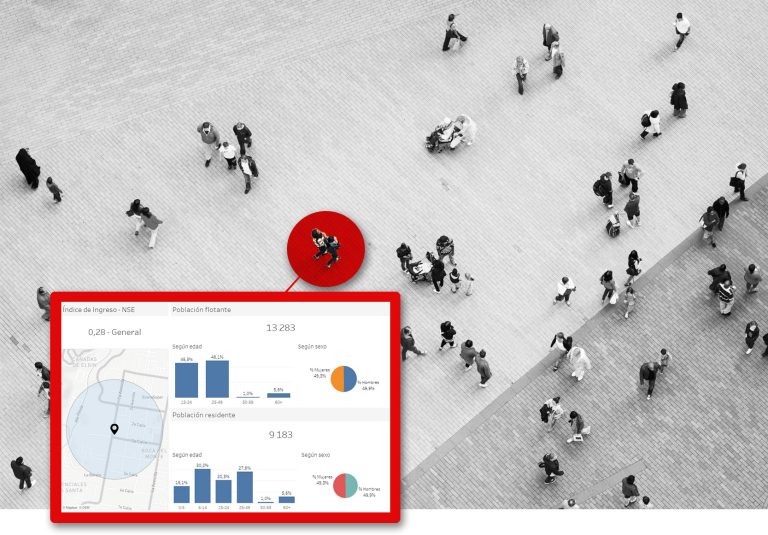
Competitor analysis
Location intelligence analytics is not only a valuable tool for internal analysis. It is also powerful to analyze the competition. Through location data, companies can answer key questions about their competitors like:
- Who are the customers of my competitors?
- At what times do they register more visits?
- What is their estimated revenue per store?
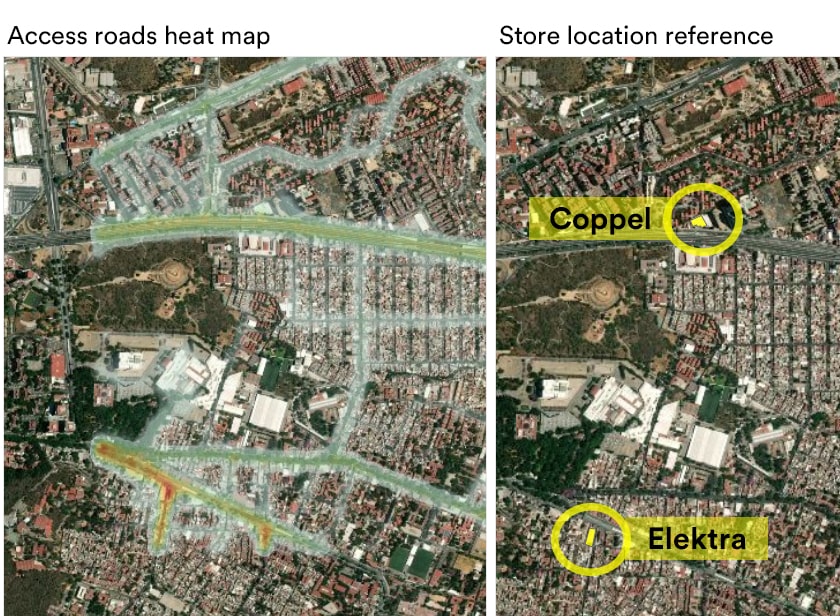
Risk Management
Location intelligence software help organizations identify, assess, and mitigate potential risks by providing a spatial context to their data. Location data can range from analyzing the impact of natural disasters on operations to uncovering likely fraud patterns or security threats.
Gaining insights from location intelligence analytics gives businesses an edge. It helps them identify market trends, understand competitor strategies, and uncover untapped market opportunities. This enables them to stay ahead of their competition.
Increased Efficiency
By integrating location data analysis into their operations, organizations can streamline processes, reduce costs, and enhance productivity.
Other examples of how to use location data
- Comparative analysis between points of sale
- Analysis of the competitors´ performance
- Analysis of the immediate surroundings of a point of sale
- Floating and Resident Population Maps
- Sales forecasting models
- Maps of Income Level and interests of the population
- Population Heat Maps
- Vehicle density and concentration maps
- Pedestrian influx model at points of sale
- Index of suitability of areas for new points of sale
Predictive location analytics: Combining the power of location data & predictive modeling
Imagine a world where businesses can precisely anticipate emerging trends, behaviors, and events. Predictive location analytics enables organizations to make informed decisions by enhancing business strategies, optimizing resources, and identifying growth opportunities.
At its core, predictive location analytics combines the strengths of two robust methodologies—location analytics and predictive modeling. Predictive analytics can project future outcomes based on historical and real-time data using sophisticated algorithms, Machine Learning, and Artificial Intelligence.
Combining these two creates an incredibly accurate spatial analysis tool for forecasting patterns, customer behavior, and potential risks or opportunities.
How Location Intelligence Tools can boost a sales team performance
Location Intelligence Tools revolutionize how sales teams operate. These tools can optimize sales routes, personalize sales strategy pitches and provide better personalization for customers.
Sales teams must leverage every possible advantage to stay ahead. Location Intelligence Tools strengthen any sales strategy with invaluable insights about the market, the consumers, and the competition.
Advanced mapping technology and location data provide the basis for location intelligence solutions. These tools offer comprehensive knowledge about sales territories, enabling better decision-making.
Location analytics solutions explore complex location data. Their objective is to visualize target areas (and trade areas). This is done to identify potential leads with high potential.
Location intelligence tools are also helpful in optimizing sales routes and maximizing time spent engaging with customers.
By integrating location data with existing CRM systems, Location Intelligence Tools offer a deeper understanding of customer behavior and preferences. This insight results in a more personalized and compelling sales approach.
The role of Location Intelligence for brick-and-mortar retailers
Location intelligence has emerged as a powerful tool to help retailers make data-driven decisions and improve their business performance.
Brick-and-mortar retailers must leverage every advantage to stand out from the crowd. Using location data analysis, retailers can gain actionable insights to increase customer engagement, improve store performance, and optimize marketing strategies.
Users have modified their consumer patterns in the past few years. Consumers’ mobility has drastically changed in most cities, making it hard to determine (without precise data) the location for the next opening.
The new purchasing patterns (now more omnichannel than ever) have made it even harder to answer the question: “Should we open in this city?”
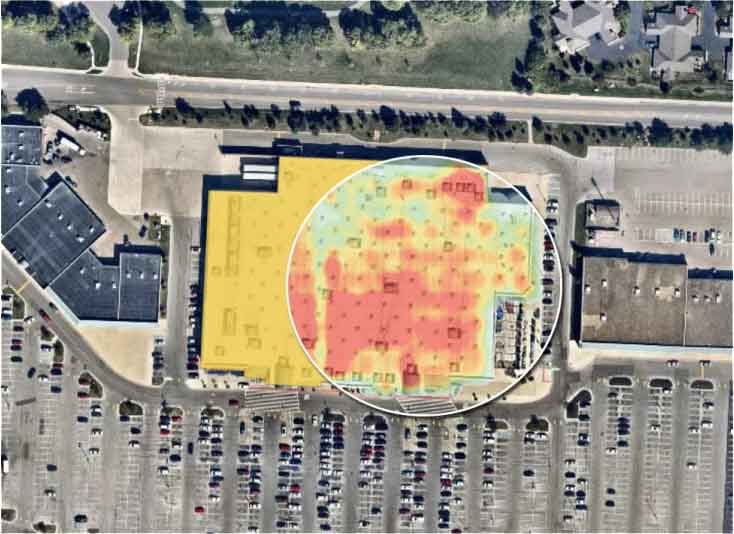
Analyzing foot traffic patterns
Location intelligence brings a more precise foot traffic analysis. Location data helps retailers understand consumer behavior around their stores using data from sources like GPS, Wi-Fi, and mobile devices.
This information allows brands to optimize store layouts and product placements to maximize sales and enrich their shopping experience.
Location analysis data shows you all the mobility patterns around a given point of sale or area
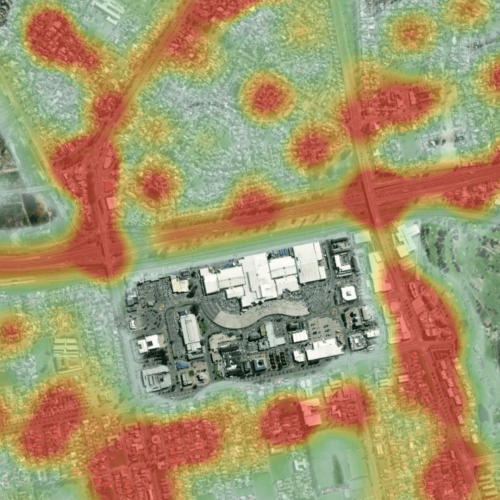
Location data provides useful user behavior analysis in any given area:
- Where do visitors come from?
- How far do they travel to visit the store?
- Do they work near the store?
- What is the income level of the visitors of the store?
- How often do they visit each store?
- Do they visit the competitor’s stores?
Identify valuable customers
Location intelligence allows retailers to identify and target their most valuable customers with personalized marketing campaigns. Brick-and-Mortar brands can create campaigns that appeal to their core audience. They can do this by analyzing demographic data, spending patterns, and other customer-specific factors.
This location-targeted approach increases customer loyalty while allocating marketing budgets more effectively.
Retail site selection
Location data is also valuable when selecting new store locations or assessing the performance of existing ones. Retailers can use location intelligence to analyze the factors that can determine the success or failure of a new site.
Population density, competitor presence, and local economic conditions are among these factors.
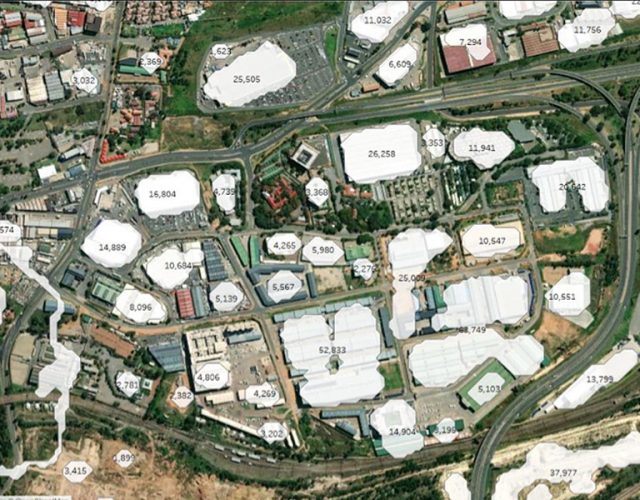
Optimizing supply chain operations
Retailers can make informed decisions about route efficiency and delivery methods. How? Thanks to real-time data on factors like traffic patterns, weather conditions, and vehicle locations.
This optimization ultimately leads to cost savings and improved customer satisfaction.
Did you know? With our location intelligence solutions you can make a comparative analysis between stores
We provide you information about your users’ movement patterns. Get a step-by-step tracking within your store to understand their behavior trends.
- Evaluation of movement patterns between stores of the same format and between different stores.
- Comparative analyses are useful for the development of both internal and competitive benchmarks.
- The data allows the creation of performance indicators, both in visitation and in the use of space, and improvement in the mobility of people.
The importance of choosing the right location intelligence tools
A critical aspect of location data is its effectiveness and usage. By leveraging the right location intelligence tools, businesses can unlock invaluable insights, streamline operations, and drive growth.
Choosing the right location data software and location intelligence tools is essential to reap the full benefits of location analytics.
Elements to consider when choosing location analytics tools
Here are the crucial factors to keep in mind when choosing the best location intelligence software and solution
Data Integration Capabilities
A powerful location intelligence tool should be able to integrate seamlessly with existing data sources and systems.
Organizations must ensure the chosen location analytics solution is capable of supporting different data formats. It must also be able to easily connect with databases, CRM systems, business data software and other relevant data platforms.
Scalability and Performance
As a business grows, the volume and complexity of its location data will likely increase. Choosing the right location analytics software is crucial. It must be able to scale with the organization. Also, it should be able to handle large datasets and deliver insights quickly and efficiently.
User-Friendliness and Accessibility
Location intelligence tools should be intuitive and easy to use. This should be considered in light of the technical expertise of every person involved in the analysis process.
Companies should choose a solution that provides a user-friendly interface. It should also feature clear visualizations and guided analytics. This will enable users to generate valuable insights quickly.
Customization and Flexibility
Every organization has unique requirements and objectives. A good location data software should offer customizable features, allowing tailored analyses, reports, and visualizations to meet specific needs.
Analyze the tools that support different types of analytics. Examples include spatial, predictive, real-time and prescriptive analytics. This will ensure that you have the most useful insights for your business.
Security and Compliance
Data compliance is a must for every organization. Choosing a location intelligence tool that adheres to strict security standards and complies with relevant data protection regulations is essential.
Support and Training
Implementing a new location analysis softwarte can be complex. Opting for a solution provider with comprehensive support is vital for a smooth transition and ongoing success. This support should include technical assistance and a responsive customer service team.
Businesses should consider the cost of the location intelligence tool. They should also consider the return on investment (ROI) that it will bring to the organization.
Organizations need to compare the investment with potential benefits in order to ensure a strong ROI. Potential benefits include improved decision-making, cost savings and increased revenue.
Our recommendation for you
We not only can provide you all of the above. Also, our location intelligence solutions go beyond any location intelligence analytics software. We adapt our proven methodology according to your data needs.
These are some examples of valuable insights we can bring you:
- Identification and characterization of consumers of all types of products or services, in any area or city.
- Identification and analysis of locations and areas suitable for expansion strategies and opening of new points of sale.
- Evaluation of purchasing potential by zones, neighborhoods, and even streets, and analysis of competitors with predictive analytics models.
PREDIK Data-Driven: An expert location analytics company
Implementing a new location analysis softwarte can be complex. Opting for a solution provider with comprehensive support is vital for a smooth transition and ongoing success. This support should include technical assistance and a responsive customer service team.
Businesses should consider the cost of the location intelligence tool. They should also consider the return on investment (ROI) that it will bring to the organization.
Organizations need to compare the investment with potential benefits in order to ensure a strong ROI. Potential benefits include improved decision-making, cost savings and increased revenue.
